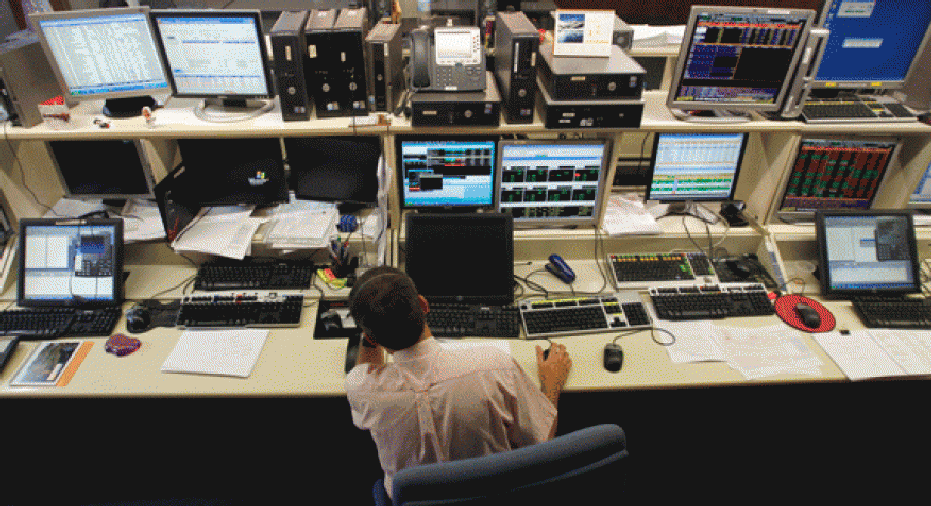Global Bonds, Stocks Lashed as Easy-Money Policy Is Seen at Limit

As bond yields across markets hit multi-month highs for a second session on Monday, global investors were harshly reminded that central banks may be out of both ammunition and ideas to stimulate economies - eight years after the global financial crisis provoked an unprecedented flood of central bank liquidity to keep markets afloat.
Long-term Japanese bond yields hit their highest levels in six months on Monday as prices tanked and 10-year U.S. Treasury yields held near 2-1/2-month highs struck on Friday as the prospect of the Federal Reserve raising policy rates again suddenly looked liked it might actually happen.
That is one reason investors think this selloff will run deeper. It has already pushed the world's most-watched stock volatility index to its highest levels since late June.
The benchmark U.S. S&P 500 stock index lost 2.5 percent on Friday -- its biggest fall in nearly three months -- while yields on U.S. 10-year and 30-year paper spiked to 11-week peaks.
Yet, the speed of the slide in bonds -- and the force with which stock markets were being dragged down alongside -- showed it was clearly not just the Fed weighing on investor sentiment.
The European Central Bank's policy review last Thursday, more hawkish comments from the Fed on Friday, and simmering speculation the Bank of Japan is thinking of ways to steepen its yield curve have rudely confronted investors with what they may have quietly feared all year: Central banks are running out of stimulus options.
"Today has become a bit of a perfect storm for selling," said Gavin Parry, Hong Kong-based managing director at brokerage Parry International Trading Ltd.
That storm, according to Parry, includes geopolitical risks from North Korea's nuclear test on Friday and trading disruptions in China because of festival holidays later this week.
As of today, U.S. interest rate futures <0#FF:> imply only a one-in-four chance of a move when the Fed meets on Sept 20-21, although three Fed speakers are due to speak this week and could tilt the odds towards a rate rise in September.
Any hint of hawkishness is likely to put further pressure on bonds and equities prices.
Market disappointment that the ECB didn't ease last week, or even hold out the promise of more stimulus, was behind the global selloff. The yield on benchmark German debt, for instance, had turned positive for the first time since July 22.
"It's a natural situation when we don't know what central banks will do," said the chief portfolio manager of a Tokyo-based fixed-income fund.
"Unless we have some idea of what the Fed and the BOJ will do, then we aren't able to say, 'Okay, here is a good level at which to buy the long end.' So we hesitate."
END OF UNORTHODOXY
While some investors are holding out for the Bank of Japan, one of the earliest adopters of unorthodox monetary policy, to do more, others think it has hit the practical limits of buying government bond and stocks and driving interest rates into negative territory.
"Investors also watch BOJ policy closely for what it says about the durability and scalability of unorthodox monetary easing generally," HSBC economist Frederic Neumann said in a note. "A disappointment would thus raise broader questions for other central banks as well."
BOJ sources have said the central bank is thinking up ways to steepen the yield curve as a means to reduce short-term costs for businesses while still protecting Japanese banks. .
And while officials from the Group of 20 nations broadly agreed at a meeting in China last week that monetary policy alone could not help a world where growth has languished since the 2008 crisis, governments in the biggest economies, including some with severe debt burdens, have said little about further fiscal spending.
"We have been here before, though markets are increasingly looking at the probability that central banks may be running out of ammunition to help the global economy," said Nicholas Yeo, head of Chinese equities at Aberdeen Asset Management in Hong Kong which has $402.9 billion in assets under management globally. (Additional reporting by Lisa Twaronite and Shinichi Saoshiro in Tokyo.; Writing by Vidya Ranganathan in Singapore.; Editing by Eric Meijer)



















